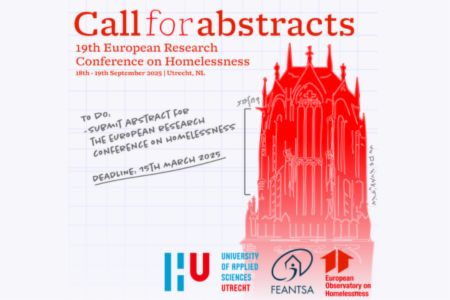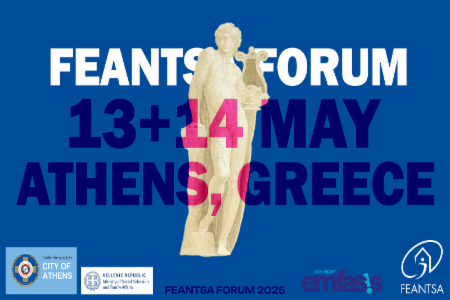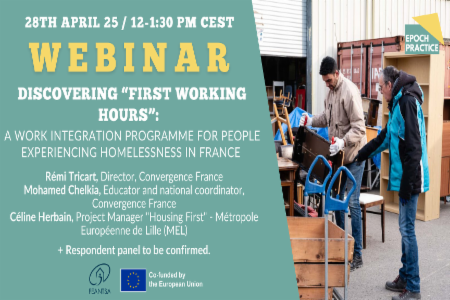FEANTSA and the CANCERLESS consortium call on the European Commission to include ‘housing situation’ as one of the inequality dimensions of the EU Cancer Registry
Download the letter here in English (online PDF)
Download the letter here in Greek (online PDF)
Research shows that nearly one in three deaths of homeless people were due to causes amenable to timely and effective health care and found that cancer is the second most common cause of death among the homeless population (Aldridge, 2019). Cancer mortality is two times higher among homeless people, compared to the general adult population in high-income countries (Asgary, 2018). People experiencing homelessness are at high risk of suffering from cancer and often they are deprived of primary or secondary cancer prevention, combined with difficulties in navigating complex and often fragmented health care systems (Lawrie et al., 2020; Luchenski et al., 2018). To overcome these barriers and risks that homeless people experience, EU health policies should include the element of housing as an important determinant of health.
People who live in marginalisation, including homeless people, are at high risk of experiencing poor health and they struggle to access health and support services (Nobody Left Outside Thematic Network, 2019). It is well known that being homeless has a significant impact on people’s health. Enormous barriers and obstacles to accessing healthcare result in an average age of death of 43 for women and 47 for men who live in homelessness. The major factors impacting on the health of homeless people are i) poor physical health, ii) poor mental health and iii) substance misuse. These tri-morbidity factors arise from the poor quality of life from living on the street or in shelters and the mental strain and anxiety resulting from rough sleeping.
FEANTSA and the CANCERLESS consortium congratulate the Commission on developing the EU Cancer Plan, and would like to take this opportunity to welcome the new initiatives launched at the beginning of February, to advance on the fight against cancer. We find that the Cancer Registry and the inequality dimensions that it introduces, respectively inequalities between countries, gender, educational attainment and income level, as well as disparities between urban and rural areas and age differences will contribute to successfully implementing the EU Cancer Plan. In this context and for the reasons shown above, we would also want to raise awareness on the impact that living situations may have on individuals who experience poor health, in short on the importance of housing as a determinant of health.
We therefore call for including ‘housing situation’ as one of the dimensions of the Cancer Registry, which we strongly believe it will contribute to ensuring that objective number 1 of the European Commission in the fight against cancer ➞ ‘Everyone in the European Union should get the cancer treatment they need’ is successfully achieved and that people experiencing homelessness are not excluded from the process of identifying inequalities in the cancer care pathway from prevention to end-of-life care. We believe this action is furthermore necessary given that the Registry uses data sources submitted by countries to Eurostat, which does not include comprehensive and updated information on housing difficulties and homelessness. FEANTSA has previously recommended to make mandatory the optional questions in Eurostat's 2018 ad-hoc module on housing difficulties and experiences of homelessness and extend it to all Member States by integrating them into the EU-SILC annual survey on income and living conditions.[1]
About the EU Beating Cancer Plan
In early 2021, the European Commission adopted “Europe's Beating Cancer Plan”[2] renewing its commitment to cancer prevention, treatment and care and to put forward concrete, ambitious actions that will support, coordinate and complement Member States’ efforts to reduce the suffering caused by cancer. A year later, on the 2nd of February, four new EU Cancer Plan actions were launched, to support Member States in addressing inequalities, improving screening and vaccination against HPV, and supporting persons who have experienced cancer.
The European Cancer Inequalities Registry is one of the flagship initiatives of Europe’s Beating Cancer Plan, and as such reflects the Plan’s commitment to understand, address and reduce cancer inequalities between and among Member States. The registry will identify trends and disparities between Member States and regions. It also sheds light on inequalities in cancer prevention and care due to gender, educational attainment and income level, as well as disparities between urban and rural areas. The Registry will guide investment and interventions at EU, national and regional level.
[1] Sixth Overview of Housing Exclusion in Europe, Abbé Pierre Foundation and FEANTSA, 2021, available at https://www.feantsa.org/public/user/Resources/reports/2021/6th_Overview_of_Housing_Exclusion_in_Europe_2021_EN.pdf
[2] https://ec.europa.eu/commission/presscorner/detail/en/IP_21_342





